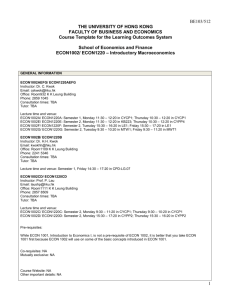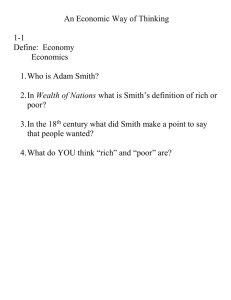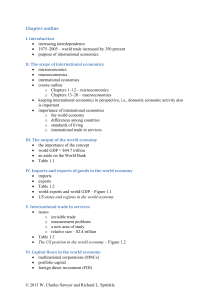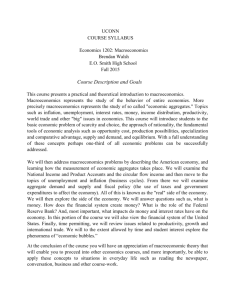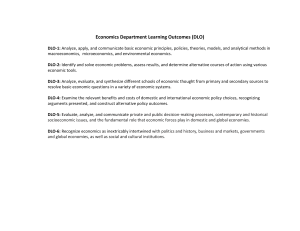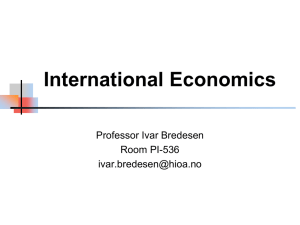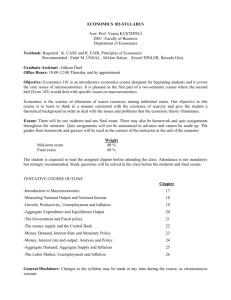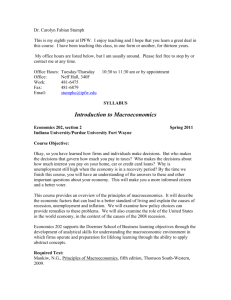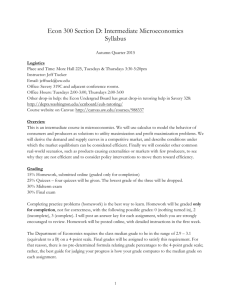4-year curriculum - the School of Economics and Finance
advertisement
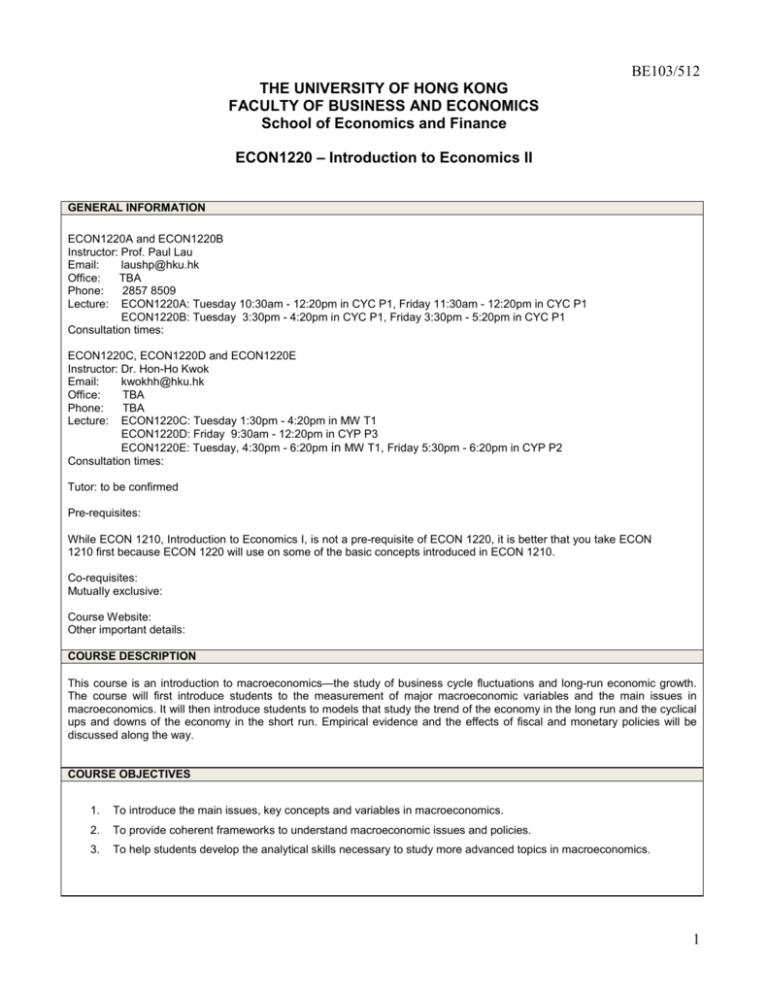
BE103/512 THE UNIVERSITY OF HONG KONG FACULTY OF BUSINESS AND ECONOMICS School of Economics and Finance ECON1220 – Introduction to Economics II GENERAL INFORMATION ECON1220A and ECON1220B Instructor: Prof. Paul Lau Email: laushp@hku.hk Office: TBA Phone: 2857 8509 Lecture: ECON1220A: Tuesday 10:30am - 12:20pm in CYC P1, Friday 11:30am - 12:20pm in CYC P1 ECON1220B: Tuesday 3:30pm - 4:20pm in CYC P1, Friday 3:30pm - 5:20pm in CYC P1 Consultation times: ECON1220C, ECON1220D and ECON1220E Instructor: Dr. Hon-Ho Kwok Email: kwokhh@hku.hk Office: TBA Phone: TBA Lecture: ECON1220C: Tuesday 1:30pm - 4:20pm in MW T1 ECON1220D: Friday 9:30am - 12:20pm in CYP P3 ECON1220E: Tuesday, 4:30pm - 6:20pm in MW T1, Friday 5:30pm - 6:20pm in CYP P2 Consultation times: Tutor: to be confirmed Pre-requisites: While ECON 1210, Introduction to Economics I, is not a pre-requisite of ECON 1220, it is better that you take ECON 1210 first because ECON 1220 will use on some of the basic concepts introduced in ECON 1210. Co-requisites: Mutually exclusive: Course Website: Other important details: COURSE DESCRIPTION This course is an introduction to macroeconomics—the study of business cycle fluctuations and long-run economic growth. The course will first introduce students to the measurement of major macroeconomic variables and the main issues in macroeconomics. It will then introduce students to models that study the trend of the economy in the long run and the cyclical ups and downs of the economy in the short run. Empirical evidence and the effects of fiscal and monetary policies will be discussed along the way. COURSE OBJECTIVES 1. To introduce the main issues, key concepts and variables in macroeconomics. 2. To provide coherent frameworks to understand macroeconomic issues and policies. 3. To help students develop the analytical skills necessary to study more advanced topics in macroeconomics. 1 COURSE LEARNING OUTCOMES Aligned Programme Learning Outcomes Course Learning Outcomes CLO 1. To understand fundamental concepts and measurement issues of macroeconomics PLO 1, 4 CILO 2. To understand fundamental theories of macroeconomics, and to develop necessary PLO 1, 2, 3, 4 analytical skills CILO 3. To identify local and global macroeconomic issues PLO 3, 5 CILO 4. To understand theories and practices of monetary and fiscal policies PLO 4 COURSE TEACHING AND LEARNING ACTIVITIES Expected contact hour* Study Load (% of study) T&L1. Lectures 36 hours 30% T&L2. Tutorials 9 hours 7.5% T&L3. Exercises 12 hours 10% T&L4. Self Study 63 hours 52.5% 120 hours 100% Weight Aligned Course Learning Outcomes 10% 1, 2, 3, 4 35% 1, 2, 3, 4 55% 1, 2, 3, 4 Course Teaching and Learning Activities Total Assessment Methods Brief Description (Optional) A1. Exercises A2. Term Test(s) A3. Final Exam Total 100% *The expected contact hours are based on the assumption that there are 12 weeks of lectures in the semester. The number st nd of weeks of lectures differs in the 1 semester and the 2 semester. STANDARDS FOR ASSESSMENT Course Grade Descriptors A+, A, A- B+, B, B- C+, C, C- Strong evidence of superb ability to fulfill the intended learning outcomes of the course at all levels of learning: describe, apply, evaluate, and synthesize Strong evidence of the ability to fulfill the intended learning outcomes of the course at all levels of learning: describe, apply, evaluate, and synthesize Evidence of adequate ability to fulfill the intended learning outcomes of the course at low levels of learning such as describe and apply but not at high levels of learning such as to evaluate and synthesis 2 D+, D F Evidence of basic familiarity with the subject Little evidence of basic familiarity with the subject Assessment Rubrics for Each Assessment (Please provide us the details in a separate file if the space here is not enough) Performance Level Assessment Rubics for the Exercises, Term Test(s), and Final Exam Each of the Exercise, Term Test and Final Exam may involve Multiple Choice Questions, Short-Answer Questions or both. The relative weight of the two will be specified in each of the Exercise, Term Test and Final Exam. Outstanding (I) Multiple Choice Questions All or almost all of the answers are correct. A+, A, A(II) Short-Answer Questions For all or almost all of the questions, the student: (a) provides correct answer(s), and (b) analyzes in a clear and logical manner. Proficient (I) Multiple Choice Questions Most of the answers are correct. B+, B, B(II) Short-Answer Questions For most of the questions, the student: (a) provides correct answer(s), and (b) analyzes in a clear and logical manner. Competent (I) Multiple Choice Questions A reasonable proportion of the answers are correct. C+, C, C(II) Short-Answer Questions For a reasonable proportion of the questions, the student: (a) provides correct answer(s), and (b) analyzes in a clear and logical manner. Adequate (I) Multiple Choice Questions A few of the answers are correct. D (II) Short-Answer Questions For a few of the questions, the student: (a) provides correct answer(s), and (b) analyzes in a clear and logical manner. Failure (I) Multiple Choice Questions All or almost all of the answers are incorrect. F (II) Short-Answer Questions For all or almost all of the questions, the student cannot: (a) provide correct answer(s), and (b) analyze in a clear and logical manner. 3 COURSE CONTENT AND TENTATIVE TEACHING SCHEDULE Topic Textbook (Hubbard and O’Brien) Reference (Frank and Bernanke) Introduction Chapter 1 Chapter 1 Macroeconomics: Data and Issues Chapters 8 - 10 Chapters 4 - 6 The Economy in the Long Run Chapter 11 Chapters 7 - 9 The Economy in the Short Run Chapters 12 - 13 Chapter 10 and 13 Monetary and Fiscal Policy Chapters 14 - 17 Chapters 11, 12 and 14 The International Economy Chapters 18 - 19 Chapter 15 REQUIRED/RECOMMENDED READINGS & ONLINE MATERIALS (e.g. journals, textbooks, website addresses etc.) Required Textbook Hubbard, R. Glenn and Anthony P. O’Brien (2013), Macroeconomics. Fourth Edition, Pearson International Edition. Reference The following is a good reference for the course: Bernanke, Ben S. and Robert H. Frank (2013), Principles of Macroeconomics. Fifth Edition, McGraw-Hill Irwin. MEANS/PROCESSES FOR STUDENT FEEDBACK ON COURSE o o o conducting mid-term survey in additional to SETL around the end of the semester Online response via Moodle site Others: ________________________ (please specify) COURSE POLICY (e.g. plagiarism, academic honesty, attendance, etc.) Term Test(s) and Final Examination There will be no make-up for the term test(s). If you do not attend any test, you will automatically get zero mark for the test. However, if there is a legitimate medical reason that you miss the test, you will need to inform the teacher or the teaching assistant and provide medical certificate within 72 hours of the test. In such case, the weight of the term test will be allocated to the final exam. The final examination (2 hours) is cumulative. The term test(s) and the final exam are closed book and closed notes. You will need to bring a calculator to the term test(s) and the final exam. Late Exercises No exercises handed in late will be accepted Academic Conduct The University Regulations on academic dishonesty will be strictly enforced! Please check the University Statement on plagiarism on the web: http://www.hku.hk/plagiarism/ Academic dishonesty is behavior in which a deliberately fraudulent misrepresentation is employed in an attempt to gain undeserved intellectual credit, either for oneself or for another. It includes, but is not necessarily limited to, the following types of cases: a. Plagiarism - The representation of someone else’s ideas as if they are one’s own. Where the arguments, data, designs, 4 etc., of someone else are being used in a paper, report, oral presentation, or similar academic project, this fact must be made explicitly clear by citing the appropriate references. The references must fully indicate the extent to which any parts of the project are not one’s own work. Paraphrasing of someone else's ideas is still using someone else’s ideas, and must be acknowledged. b. Unauthorized Collaboration on Out-of-Class Projects - The representation of work as solely one’s own when in fact it is the result of a joint effort. Where a candidate for a degree or other award uses the work of another person or persons without due acknowledgement: (1) The relevant Board of Examiners may impose a penalty in relation to the seriousness of the offence; (2) The relevant Board of Examiners may report the candidate to the Senate, where there is prima facie evidence of an intention to deceive and where sanctions beyond those in (1) might be invoked. ADDITIONAL COURSE INFORMATION (e.g. e-learning platforms & materials, penalty for late assignments, etc.) Advice for students who have some training in Macroeconomics (e.g., HKALE/DSE in Economics) A fair amount of the course materials will overlap with the Economics Subject in HKALE/DSE (especially the materials covered in the first 3-4 week). However, this course puts more emphasis on helping students develop their analytical skills (especially the second half of the course). Thus, an excellent grade in Economics in HKALE/DSE does not guarantee a good grade in this course. In the past, there were students who did well in the HKALE/DSE in Economics but got a fairly poor grade in this course (or even failed) primarily because they underestimated the rigor of this course and rarely attended the lectures. 5
